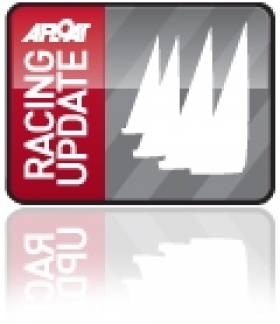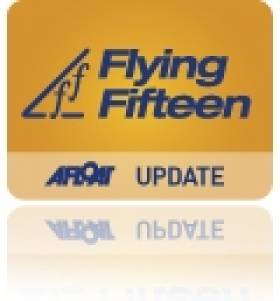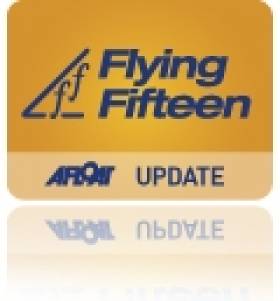Displaying items by tag: Carlingford Lough YC
#idra14 – The June bank holiday weekend again saw the IDRA 14's head north to Killowen, near Rostrevor in Co. Down writes Ian Sargent. Carlingford Lough Yacht Club's location is nestled on the shore with the majestic Mourne mountains behind and stunning views of the Lough and the Cooley mountains to the front – surely the most scenic sailing location in Ireland.
The small number of boats (8 this year) was augmented by the Class entourage and a large number of tents, camper vans etc took up residence on the Friday. Sadly two of our regular attendees – Killain Sargent & Yvonne Murray (14/157) and Paddy O'Kelly (14/51) have emigrated to Australia since last year. They did however send their regards from Oz to us for the event on facebook.
The hospitality of the Club bar was enjoyed at length each night into the early hours of the morning – thank you Seamus McNally (the barman). On the Saturday evening were were entertained by the CLYC Choir who were followed by our young musicians Ronah Lonergan, Hazel O'Kelly & Emma Richardson,
Our racing schedule for the event is different than most Classes – we only want two one hour back to back races each day in the afternoon each day. This format has made the event very popular with the Class as the time spent on the water is not too long and so everyone brings their kids and grandkids etc which results in a great atmosphere on shore.
The sailing on the Saturday was a mixed bag as the renowned vagares of the winds in Carlingford again made themselves known – large patches of calm interspersed with other patches of wind that constantly varied in direction and later even rising enough to have one capsize. Also there were the usual early season gear failures. The race officer succeeded in getting the two races completed and the competitors happily returned to shore. Race 1 was won by 14/163 (Philip Hackett) and race 2 by 14/112 (Alan Henry).
On the Sunday afternoon we had two more races – one near the club and the second the usual long race taking in a mark at Warrenpoint. This long race is eagerly awaited each year as it can become a test of endurance if the wind gets up – and it did! More capsizes and gear failure followed. Two boats found a mark closer than the one at Warrenpoint and arrived back elated only to find they had not completed the full course. Everyone arrived back quite exhausted and were delighted that was the last race. The 3rd race was again won by Alan Henry and the long 4th race by 14/140 (Frank Hamilton) after a closely fought battle with 14/126 (Charles Sargent) and 14/38 (Alan Carr).
The prizegiving was held outside th Club in warm sunshine – in total contrast to recent years.
Special presentations were made to the Commodore of CLYC Philip O'Connor and to our Ciaran Browne who is emigrating shortly to the USA. Sadly emigration is now becoming more than an occasional event in our sport.
Next year will be our 20th visit to CLYC. Very few Classes have an away event in one location that has continued unbroken for such a long number of years. We have also built up a great rapport with thr CLYC members – many of whom come down each year to join us in the shoreside activities.
We would like to express our thanks to Carlingford Lough Yacht Club for their hospitality and continued support for this event. So now roll the 20th visit in 2015.
Northern Chanmpionship Results:
1st 14/112 "Sunshine" Alan Henry / Simon Reville SDC / HYC
2nd 14/140 "Dunmoanin" Frank Hamilton / Jennifer Byrne DMYC
3rd 14/38 "Starfish" Alan Carr / Dana Kilroy SDC
4th 14/126 "Smurfette" Charles Sargent / Fergal O'Flaherty SDC / DMYC
5th 14/163 "Chance" Philip Hackett / Fiachra Collins CY&BC
6th 14/31 "Shearwater" Ciaran Browne/ Peter Dignam CY&BC
7th 14/160 "Dragon" Ronan Melling / Lorraine Smith CY&BC
8th 14/71 "Atomic" Donal Heney / Louise Coulter CY&BC
Warrenpoint Trophy Race:
14/140 "Dunmaonin" Frank Hamilton / Jennifer Byrne DMYC
Flying Fifteens Fight it out in Carlingford
#flyingfifteen – Four points separates the top four boats at the Flying Fifteen Southern Championship after day one on Carlingford Lough yesterday.
Killyleagh's Andy McClery took two bullets to lead after three races in 14 knots. Race three saw Gerry Reilly take a tidal advantage on the right side of the Lough to take the winning gun.
The scoreboard sees Northern Ireland boats on top in the fifteen boat fleet - 1) McClery 2) Chamberlin 3) Reilly 4) McKee.
David Mulvin in sixth keeps the flag flying for the Dun Laoghaire fleet.
Big FF Turnout in Carlingford
The fleet drawn from Strangford Lough, Carrickfergus, Dunmore East, Dun Laoghaire as well as the host port almost was double the size of July's National championship fleet at Carrickfergus.
But for all the new faces there were familiar names at the top. National Champions Darren Martin and Simon Murray have built a commanding lead after scoring 2,1,1 in northetly winds shifting up to 30 degrees. There is a fight for second overall but Dun Laoghaire's John Lavery and David O'Brien are detainly in with a chance counting 1,10 and 2. Brian McKee and Steven Martin are also in the frame.
Oyster Pearl Offers Big Carlingford Welcome
Every year sailors travel to Carlingford from all over Ireland and beyond (honourable mention here to our good friends from the Isle of Man) to participate in the annual Moneley Oyster Pearl Sailing Festival, which is scheduled to take place from Friday June 18th Saturday 19th June 2010.
Carlingford in County Louth is the mythic land of Setanta, Cúchulainn, Queen Medb and the Táin Bó Cúlainge. The club nestles at the foot of Slieve Foy, looks towards Carlingford Lough and the majestic mountains of Mourne.It is truly a land of legends.
Whilst competition on the water is always strong(Feeder Races on Friday and 3 Races on Saturday in IRC1/2 non IRC and White Sail), on dry land you will be assured of our warm hospitality, lots of fun and entertainment. Let us ply you with delicious Carlingford oysters washed down with a glass or two of finest Guinness whilst you relax and take in the glorious views of mountain and sea.
Carlingford has a myriad of attractions to offer visitors: golf, fishing, hill walking, horse trekking, adventure sports not to mention a host of great restaurants and cafes. Carlingford Lough has been chosen as a venue for pre-Olympic 2012 sail training,
So why not come and join us for a weekend – you never know you might decide to stay! Any queries please contact :
John Mc Kevitt Sailing Secretary and Oyster Pearl Chairman on 087/2499103 or Ian O Gorman Cruiser Fleet Captain on 087/2867747

































































